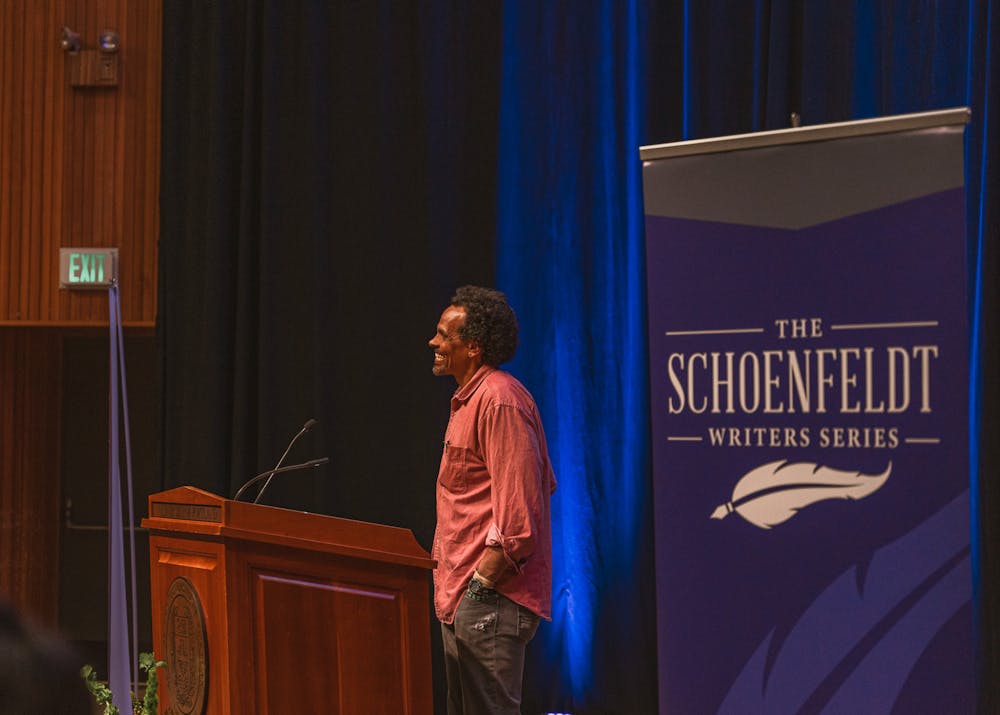For National Book Award Finalist Ross Gay, a major benefit of writing is getting his mom to read his work. But after reading one essay, “Braces on Adults,” Gay’s mother felt he exaggerated a childhood memory in which she reset his teeth inside of a Dunkin’ Donuts.
“One of the pleasures of this writing life and having my dear mother alive and interested in it is that I get to read to her stuff that she shows up in,” Gay said at the ReadUP event. “She was like, ‘You know, you maybe stretched it a little bit on that one.’”
Gay is the 2024 speaker of the Schoenfeldt Distinguished Writers Series, a UP-based event where writers visit campus to give public readings. Since 1988, the series has featured award-winning authors including Ursula K. Le Guin, Jeffrey Eugenides and Omar El Akkad.
Preceding the Schoenfeldt series is ReadUP, a campaign that strives for UP members to read the same book throughout the school year. Gay’s poetry book, “Catalog of Unabashed Gratitude,” was first distributed on Nov. 20 and discussions held by UP faculty began on March 12.
Though the event was well attended by the larger Portland community, students still maintained a presence in the crowd. Some English classes have carried on the tradition of participating in campus reading reports, according to professor Molly Hiro.
Brennen Gibbins, a first-year student who was assigned Gay’s work in an English 112 class, was interested in hearing from the poet himself.
“I just think he’ll give a different point of view than what we’ll have,” Gibbins said. “Also, it's from the author’s perspective, or a poet’s perspective, and I think that’s interesting.”
During the reading, Gay was generous with his perspective — answering questions and providing context for ideas not always visible on the page.
“This is called ‘To the Fig Tree on 9th and Christian,'” Gay said at the event. “And I want you to know that this poem, it happened. I was walking down the street in Philadelphia and I came upon a group of people really just hanging around this tree, and there was this woman sweeping up figs. This tree was making so many figs, in Philadelphia. It wasn’t like in Arizona, it was in Philadelphia, where such things don’t grow as easily. Just so you don’t miss it.”
Karen Eifler, director of a ReadUP co-sponsor, The Garaventa Center, finds Gay’s perspective to be liberating during a time of unease.
“I really want to be a joyful person,” Eifler said. “And sometimes people say you just can’t be joyful with a world as messed up as our world is. I feel like Ross Gay gave me permission to say, ‘Yep, the world’s messed up and it’s glorious at the same time.’”
Central to the event were Gay’s thoughts on joy, a major theme of his work. Gay finds that though words like ‘delight,’ ‘joy’ and ‘life’ are often conflated — there remains a difference between the three.
“Delight is the experience of being life,” Gay said at the event. “And it feels like joy is that in a way that feels more explicitly grave. [...] [Joy] takes all kinds of shapes, a dance party, [...] you really dance when you’re acutely aware that you won’t always dance. We sing together. We won’t always sing together.”
Additionally, Gay highlighted the Israel-Hamas war as central to his definition of life, and concluded with a recitation of an untitled work from Palestinian poet Nasser Rabah.
“Clearly in the midst of genocide in Gaza, [...] by which I mean something like so much of what gets called life is actually the corralling or the brutalizing or withholding of life,” Gay said at the event. “And when it feels like there's an opportunity to participate in the actions of being life in the face of that, which include the actions of articulating what you love. [...] The mycelial sense of joy that we are fundamentally connected, and there’s all these lies to the contrary, but the practice of recognizing, ‘No, we are fundamentally connected’ — that is called life.”
Camille Kuroiwa-Lewis is a reporter for The Beacon. She can be reached at kuroiwal26@up.edu.









